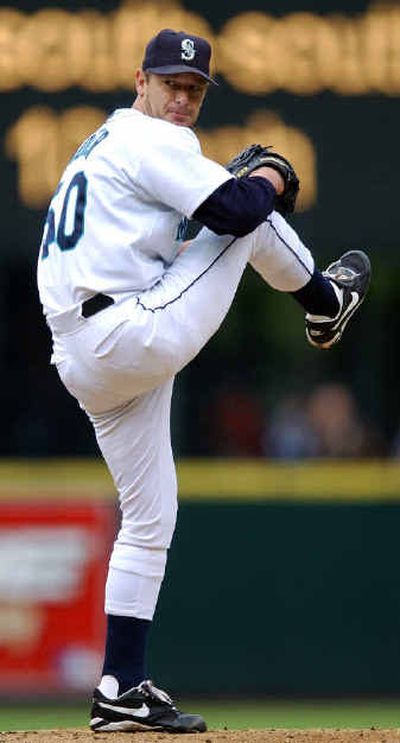Musings from M’s Moyer

TORONTO — Being 41 years old, Jamie Moyer could be forgiven for being reluctant to go through a youth movement.
In a professional career that began in 1984 and will continue with a start tonight, the Seattle Mariners’ left-hander has been through more movements than most. He’s gone through rebuilding years in Baltimore and Boston, played with bad teams in Chicago and Texas.
Moyer is a thoughtful, articulate voice in the clubhouse, a man who works on his craft and will talk to almost anyone about almost anything.
When he pitches tonight against Toronto, he will start Seattle’s 81st game of the year — the midway point to a season that has been a disaster. Asked to talk about that season and how it will impact the future, Moyer offered up his thoughts.
Have a seat there on the clubhouse stool. Spend 10 minutes with Jamie Moyer.
“It’s easy to play general manager — we all do. But we don’t know what happens behind the scenes, what contract situations come into play, what other teams offer or don’t offer,”Moyer said. “I could get rid of people. That’s not the point. The point is what you get back. That’s a tough job.
“It’s the nature of the game, that when teams get younger, they dump salaries and the players who have them. It’s an acknowledgement that they’ve made mistakes.
“Sometimes you make the right moves, get guys who have had success, but it’s just not a fit. There’s no explanation. I’ve been with teams in Baltimore and Boston that went through this. You stand back and look at it — What went wrong? — and there’s no way to see it until it’s happened.
“Sometimes you can have good players having down years. It doesn’t mean they’re done. It is what it is. What you have to look at is how players fit in, both now and down the road.
“You have players who haven’t lived up to their expectations here — players you can’t get rid of. That leaves the players you can.
“Would more changes surprise me here? No. It would take a lot to surprise me.
“It’s like the Freddy Garcia trade. You can’t know now. Time will tell you. When the team traded Randy Johnson in ‘98, you couldn’t evaluate it then — most fans and a lot of players didn’t know the guys we got back. You can talk about it now — and it worked out pretty good.
“The Mariners got Freddy Garcia, who had some good years. They got John Halama, who did a pretty good job in a few roles, and they got Carlos Guillen, who played well when he could play.
“Now you trade Freddy and get three young players back. In those two trades, you’ve traded two players for six. No one knew in ‘98 how it would work out. No one knows now how this one will work out.
“Sometimes players need a change of scenery. Not all players are consistent, it takes them awhile to become their best — and the timing for each player is different.
“Joe Carter was a box of rocks with the Cubs. Something changed for him after he’d moved on, it took time for him to be the best player he could be. You can’t judge players by their worst seasons.
“There are going to be changes here. But as individuals and as a team, you play for pride. You play to win, too, and we’re not doing a lot of that.
“It’s not any one part of this team, it’s not any one player. It’s the whole team — all of us. We all could have done better so far. We’re living with it, trying to deal with it. What you don’t know is whether it’s a bump in the road or something more.
“No one ever believes it when they talk about youth movements, but things can get worse instead of better. Every team has made mistakes, whether it’s through free agency, relying on their own kids, whatever. All teams make mistakes.
“Sometimes, it just doesn’t click. You can have a great spring training, see everything you want to see, and in the regular season you just can’t find it.
“I remember playing for Lou (Piniella) one spring and him just reaming us all after a loss in Tucson. He said you can’t just turn it on and off. He really got on us, and it didn’t look too good that spring.
“That was 2001. That was the year we won 116 games.”